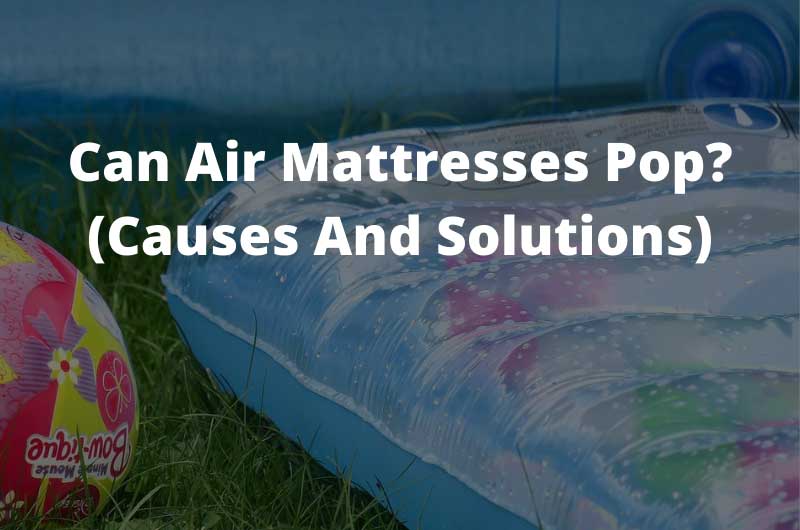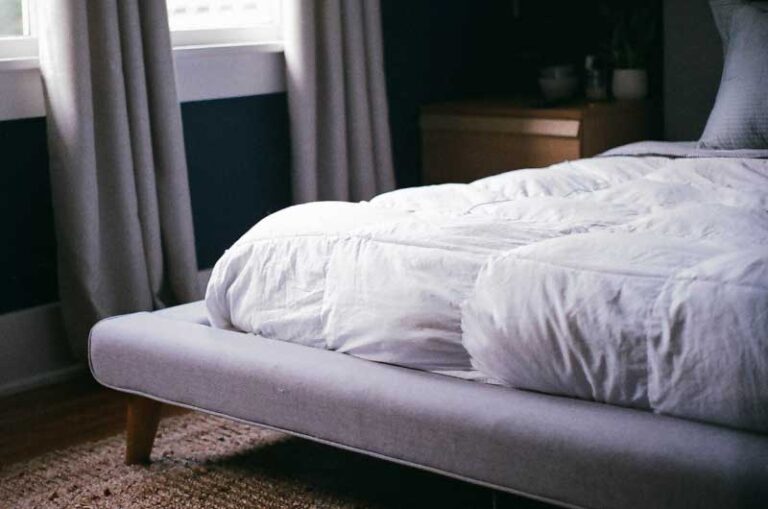Can air mattresses pop? (Causes and solutions)
If you sleep on an air mattress, it’s essential to know that they are filled with air. That’s what makes them so comfy! The problem, however, comes when the air mattress is filled past its maximum capacity—not only will it be uncomfortable to sleep on, but the mattress could also experience excess stress on the seams and may even pop!
Even if your air mattress doesn’t pop, overfilling it can cause damage like pinholes in the seams or even holes right through the material itself.
Yes, the air mattresses filled to maximum capacity, or overfilled, can pop. Overfilling your mattress causes excess stress on its seams. Seams can puncture and ultimately tear, causing you to be injured by a spring or possibly suffocate in your sleep due to your mattress collapsing around you.

Let’s explore more about this issue in this article.
How do air mattresses work?
Two leading technologies are used to inflate air mattresses: internal bladders and external pumps.
Internal bladders: Air mattresses that use an internal bladder (or air coil system) work by filling a plastic bag with heated cool water. The bag then heats up and expands, filling with hot air.
Air mattress pump: For those who have trouble heating water on their own or for those who wish to fill their mattress much quicker, external pumps can help. These pumps connect directly to your air mattress and provide you with a constant stream of cool air pumped into your bed until it reaches its desired firmness. Once you’ve got your desired firmness level, stop pumping.
What causes an air mattress to pop?
When it comes to inflatable air beds, excess stress on seams may cause popping or rupture. It would be best if you only inflate your mattress about 90 percent full and never try to put too much weight on it. The size of your sleeping area has nothing to do with what causes an air mattress to pop; instead, it is due to human error. Do not sleep on top of an already over-inflated bed.
If you leak your mattress, fix it immediately before continuing to use it. If you are experiencing loud popping noises while trying to sleep, stop using your bed until you can locate and repair any holes or leaks that might be causing these problems.
If you cannot identify any holes or leaks, contact a professional for assistance. In some cases, small tears in a seam can cause loud pops when you move around while sleeping on an airbed.
Popped Air beds can’t be reinflated
Air beds can only be blown up to about 90 percent capacity before they become too stressed. If you overinflate your bed, you risk bursting your mattress when used for its intended purpose. An overfilled mattress will feel like a giant balloon and might bulge or split along its seams. Once your mattress is punctured, it will deflate faster than usual.
You may need to throw out a popped air bed since it cannot be repaired or reinflated properly. For safety reasons, never sleep on a mattress that has been punctured by sharp objects such as scissors or knives. Many brands recommend replacing air beds every three years without being stabbed due to possible wear and tear.
DIY fixes to prevent popping of air mattress
There are a few easy ways to avoid excess stress on your air mattress’s seams and help preserve its life. The first is to check your owner’s manual for maintenance and care recommendations. These guidelines will tell you what percentage of fullness to blow up your mattress with—most likely between 30 percent and 80 percent capacity, depending on the brand.
If you don’t have access to your owner’s manual, look at where seams are located and ensure they aren’t being overstressed. If you notice any bulging or rippling in areas where seams connect, let some air out before it becomes dangerous. Finally, if all else fails, consider purchasing a new air mattress!
Disposing of your popped air bed
When your air bed has popped, do not continue to use it. This can become a safety hazard, and further damage can occur. Dispose of it properly and quickly so that you don’t experience any more injuries from using a leaking mattress.
You can dispose of it in your regular trash or recycling bin as long as you first make sure there are no sharp objects protruding from it that could puncture another bag or hole in your bin.
If you aren’t sure if it is safe to throw away, contact your local waste management office for advice. They will be able to help you figure out what to do with your damaged air bed.
Tips for preventing punctures and tears in the future
Since sleeping on a deflated air mattress can leave one feeling like they’re sleeping on a wood slab, preventing punctures and tears in your mattress is essential. Follow these tips to help protect your mattress from future punctures and rips.
- Keep pets off your mattress. Pets have sharp claws that can easily tear into an air mattress. If you want to keep pets off your bed while you sleep, put up a baby gate or use pet barriers around your bed area.
- You should also make sure there are no items lying around that could be accidentally kicked onto or near your bed while you sleep; dogs love to chew on shoes! Use fitted sheets for extra protection. While many people prefer using regular sheets for air mattresses, fitted sheets will provide more security against punctures and tears.
- Standard sheets tend to bunch up when used with an air mattress due to how thin they are compared to regular beds. Use your linens sparingly. The more layers of fabric that you place between yourself and your air mattress, the less likely it is for something sharp or hard to get through all those layers before hitting you directly.
- Don’t over-inflate your mattress. Overinflating may cause excess stress on seams, which increases the risk of rupture. It’s recommended that you only inflate your mattress to about 90 percent capacity. Each time you overfill it, the risk of rupture increases.
Conclusion
When not used, it is best to avoid overfilling your air mattress. Overfilling your mattress puts unnecessary stress on its seams, which can cause a rupture. Before using your mattress, inflate it to about 90 percent capacity and then allow it to settle overnight before using. This will help ensure your seams hold up during regular use while avoiding unnecessary stress in case of spills or accidental over-inflation.






